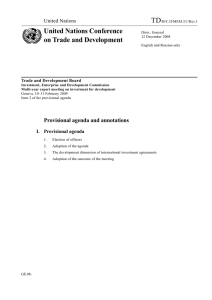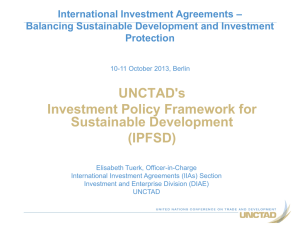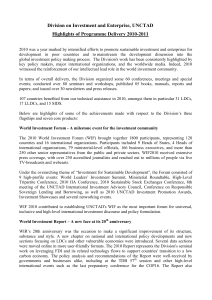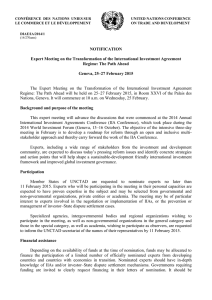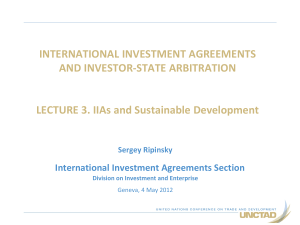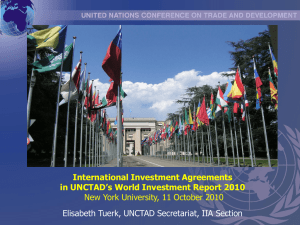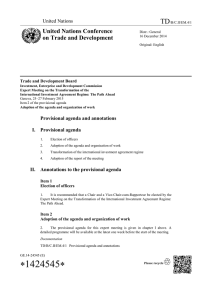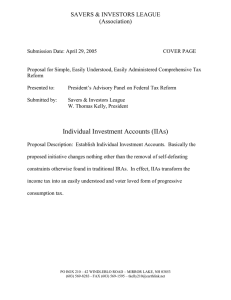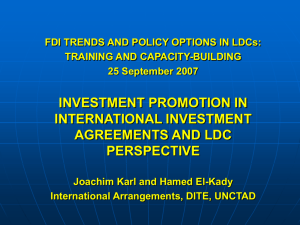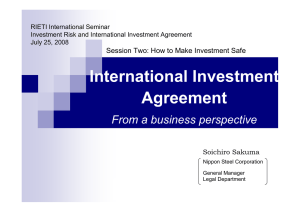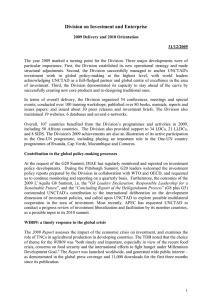CONFÉRENCE DES NATIONS UNIES SUR UNITED NATIONS CONFERENCE ON TRADE AND DEVELOPMENT
advertisement
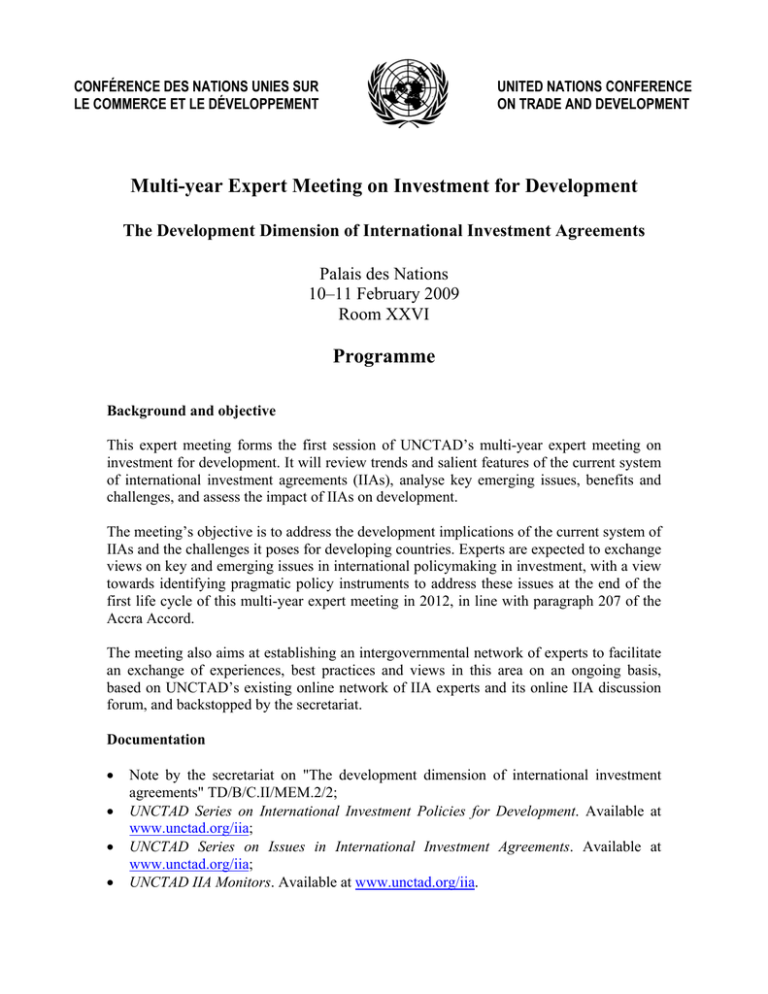
CONFÉRENCE DES NATIONS UNIES SUR LE COMMERCE ET LE DÉVELOPPEMENT UNITED NATIONS CONFERENCE ON TRADE AND DEVELOPMENT Multi-year Expert Meeting on Investment for Development The Development Dimension of International Investment Agreements Palais des Nations 10–11 February 2009 Room XXVI Programme Background and objective This expert meeting forms the first session of UNCTAD’s multi-year expert meeting on investment for development. It will review trends and salient features of the current system of international investment agreements (IIAs), analyse key emerging issues, benefits and challenges, and assess the impact of IIAs on development. The meeting’s objective is to address the development implications of the current system of IIAs and the challenges it poses for developing countries. Experts are expected to exchange views on key and emerging issues in international policymaking in investment, with a view towards identifying pragmatic policy instruments to address these issues at the end of the first life cycle of this multi-year expert meeting in 2012, in line with paragraph 207 of the Accra Accord. The meeting also aims at establishing an intergovernmental network of experts to facilitate an exchange of experiences, best practices and views in this area on an ongoing basis, based on UNCTAD’s existing online network of IIA experts and its online IIA discussion forum, and backstopped by the secretariat. Documentation • • • • Note by the secretariat on "The development dimension of international investment agreements" TD/B/C.II/MEM.2/2; UNCTAD Series on International Investment Policies for Development. Available at www.unctad.org/iia; UNCTAD Series on Issues in International Investment Agreements. Available at www.unctad.org/iia; UNCTAD IIA Monitors. Available at www.unctad.org/iia. Format of deliberations After the formal opening, the meeting will continue in an informal setting with the discussion focusing on three topics, each dealt with in a different session. Session 1 will cover recent trends and salient features of IIAs, and key emerging issues (Tuesday morning), including with regard to investor–State dispute settlement (Tuesday afternoon); session 2 will analyse the benefits and challenges of IIAs (Wednesday morning); and session 3 will discuss the way forward and the outcome of the meeting (Wednesday afternoon). National experts are invited and encouraged to take the floor in an informal tour-de-table format under each session. Practitioners and representatives of the private sector, academia, non-governmental organizations (NGOs) and other international organizations will also be asked to participate by the Chair to enrich and contribute to the exchange of experiences and the debate. All participants are invited to indicate to the secretariat, preferably in advance, under which session and topic they wish to make their principal intervention (not more than five to seven minutes). Naturally, participants are also encouraged to actively take part in the discussions that follow, and may intervene under other sessions and topics as well (not more than three to four minutes). This format is meant to ensure a lively and fruitful discussion. Tuesday, 10 February 2009 10:00 Opening and introduction Opening statement Ms. Lakshmi Puri, Acting Deputy Secretary-General of UNCTAD Item 1: Election of officers Item 2: Adoption of the agenda and organization of work 10:30 Item 3: The development dimension of international investment agreements Introduction: recent trends, key emerging issues and development impact Mr. James Zhan, Officer-in-Charge, Division on Investment and Enterprise, UNCTAD 11:00 Session 1: Trends and salient features of the current IIA system Questions to be considered: • What are the most recent developments of the IIA system and what impact, if any, will the current economic crisis have on IIAs? • Has the so-called “national security exception” in IIAs evolved to take account of the protection of strategic industries and in times of economic crises? What is the impact of sovereign wealth funds on this matter? • What impact, if any, does the new role of emerging economies as outward investors have on the IIA negotiating position of these countries? How should the potential conflict be resolved between a host country’s interest in retaining maximum discretion in its treatment of foreign investors, and a home country’s interest in obtaining ample protection for its investors abroad? • Should the above considerations figure in the negotiation of future IIAs, including the renegotiation of BITs and, if so, how? 13:00 Lunch break 15:00 Session 1 (continued, with focus on international investment law and investor–State dispute settlement) Questions to be considered: • What are the current trends in international investment law and investor–State dispute settlement? • What could be done to ease the burden of countries, in particular developing countries, resulting from investment dispute settlement procedures? • What strategies for dispute avoidance could be envisaged? 18:00 Cocktail Wednesday, 11 February 2009 10:00 Session 2: Benefits and challenges, including the impact of IIAs on development Questions to be considered: • What more could be done to enhance the investment promotion objective of IIAs? • How relevant is the issue of coherence of the IIA universe in terms of the development objective of IIAs? What policy areas are most affected by the issue of coherence or lack of it? • Is there a need to re-evaluate the actual balance of private and public interests in IIAs? And, if so, in what areas would rebalancing be required and how could this be achieved? • Are the “flexibility” mechanisms provided for in IIAs (e.g. exceptions, waivers, transition periods and safeguards) sufficient to enable host developing countries to pursue their development strategies and benefit most from foreign investment? • What else could be done to enhance the development potential of IIAs? 13:00 Lunch break 15:00 Session 3: The way forward Questions to be considered: • What types of policy instruments are needed to help countries formulate IIAs and deal with investor–State disputes? • What areas need to be strengthened and further developed in this regard, including in terms of capacity-building? • How should an intergovernmental network of experts be organized, and what should be its contribution over the life-cycle of this expert meeting? • What should be the role of the secretariat in this regard? 17:00 Conclusion (wrap-up) Mr. James Zhan, Officer-in-Charge, Division on Investment and Enterprise, UNCTAD 18:00 Closing
